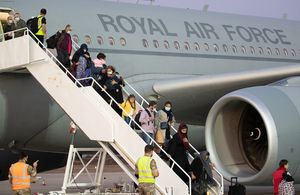Move to lateral flow tests for travel begins today
- Bookings for lateral flow tests opened on Friday and can be purchased through the private providers listed on GOV.UK from around £22 per test. NHS tests cannot be used.
- Passengers must send a photo of their test result to the private provider – failure to do so could result in a fine of £1000– and anyone with a positive result will need to take a free NHS confirmatory PCR test and isolate.
Eligible fully vaccinated passengers arriving in England from countries not on the UK’s red list can take a cheaper lateral flow test instead of a PCR from today [Sunday 24 October].
Lateral flow tests must be taken as soon as possible on the day of arrival in England or at the latest before the end of a passenger’s second day and can now be purchased from the list of private providers on GOV.UK from as little as £22 – significantly cheaper than PCR tests.
Lateral flow tests for international travel must be purchased from a private provider as NHS Test and Trace lateral flow tests cannot be used for international travel. Passengers who have already bought a PCR to use for travel do not need to buy another test as PCRs can still be used.
Passengers must take a photo of their lateral flow test and booking reference supplied by the private provider and send it back to them to verify the result. Passengers are also able to book a test which they can take on their arrival into England at testing centres located in some airports. People using PCR tests for travel will have their test reported by the company they purchase the test from.
Anyone testing positive will need to isolate and take a confirmatory PCR test, at no additional cost to the traveller, which can be genomically sequenced to help identify new variants. PCR tests can be accessed free of charge by ordering in the usual way through NHS Test and Trace – via nhs.uk/coronavirus or by calling 119. Test providers will be expected to advise people to self-isolate and direct people towards the NHS Test and Trace booking page.
Health and Social Care Secretary Sajid Javid said:
“I’m delighted that from today eligible travellers to England, who’ve had the life-saving COVID-19 vaccine can benefit from a cheaper lateral flow test, providing faster results.
“This huge boost to the travel industry and the public will make it easier and cheaper for people to book holidays and travel abroad, and it is it is because of our incredible vaccine programme that this is possible. Anyone who tests positive must take a PCR test, which, if positive, may be genomically sequenced to check for variants and further help us fight this virus.”
Transport Secretary Grant Shapps, said:
“The change in rules for post-arrival tests will give passengers more options and faster results, just in time for many half-term holidays.
“It’s thanks to the success of our vaccination programme that we can make this switch – giving the industry and consumers a much-needed boost.”
Dr Jenny Harries, Chief Executive of the UK Health Security Agency (UKHSA), said:
“Testing and self-isolating if you are positive remain crucial steps to managing the pandemic and stopping the spread of COVID-19 in the community.
“It is also critical that those who have positive Lateral Flow Tests when returning to England go on to get this checked through a NHS Test & Trace PCR. This way we can continue to monitor new variants and stay on top of the virus.
“Regular hand-washing, wearing face coverings in crowded spaces – including on transport – ventilating spaces and getting vaccinated are simple actions all of us can take to protect ourselves and those around us when we travel.”
All travellers must complete their passenger locator form prior to travel, including providing a test booking reference number supplied by a testing provider.
Anyone travelling on to Ireland, Northern Ireland, Scotland, Wales, the Channel Island or the Isle of Man in the ten days after arrival in England, must follow the rules for testing and quarantine in those places.
Passengers who are not fully vaccinated with an authorised vaccine returning from a non-red destination must still take a pre-departure test (antigen / PCR), a PCR test on day 2 and day 8 test and complete 10 days self-isolation (with the option of doing Test to Release on day 5). The vaccine programme is building a wall of defence across the country and the booster vaccine rollout is now well underway with more than 4 million people vaccinated. It is vital that eligible people get their booster jab and their flu jab to protect themselves, their loved ones and the NHS this winter.
